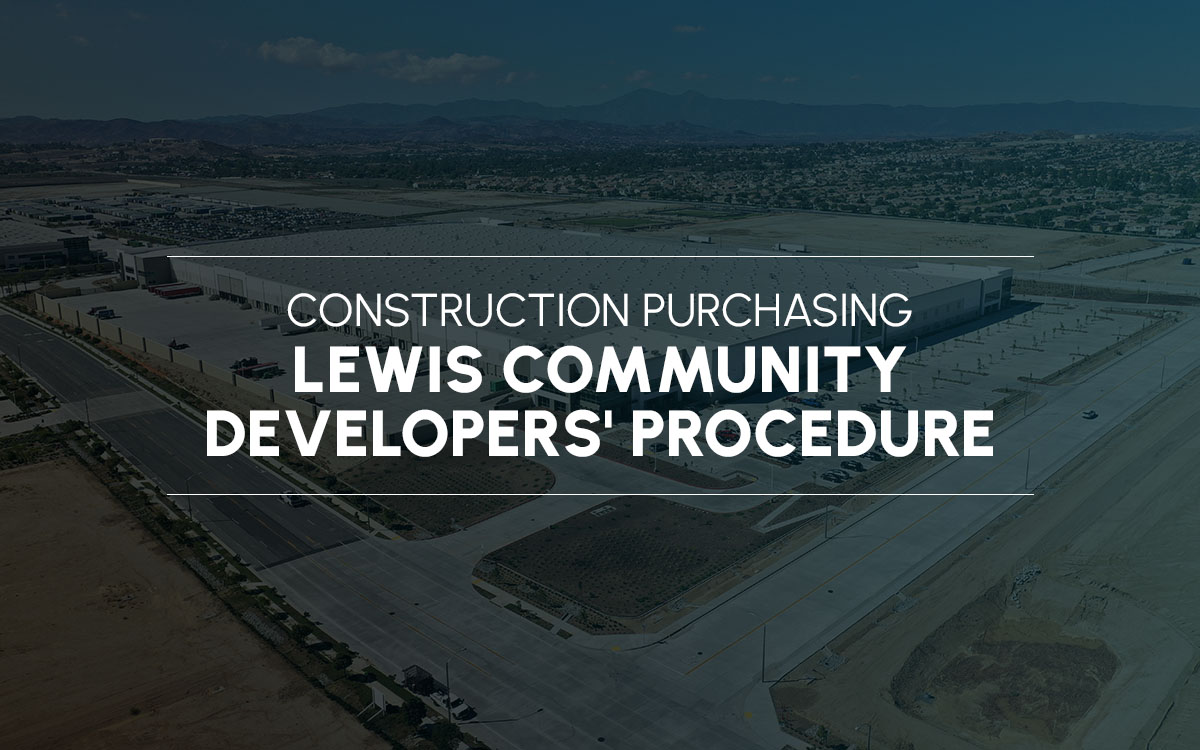
Why Purchasing Matters
Behind every successful development project is a well-oiled purchasing machine that coordinates hundreds of vendors, manages millions in contracts, and ensures every nail, pipe, and paving stone shows up exactly when needed.
At Lewis Community Developers, this process is not left to chance. We have built a systematic approach that balances cost control, quality assurance, and legal compliance all while keeping projects moving forward.
The Four Pillars of Smart Purchasing
1. The Vendor Vetting Process
The Challenge: Not all contractors are created equal. How do you separate the reliable pros from the unreliable providers? Lewis’ solution: a multi-step vetting process.
- Industry networking: They actively participate in organizations like the California Builder Industry Association to stay connected with quality vendors.
- Reference checks: Before any vendor makes the approved list, we contact past clients and get feedback from field superintendents.
- Insurance verification: Every vendor must prove they can handle the financial responsibility.
- Documentation requirements: New vendors complete a comprehensive packet and sign master agreements.
This upfront work prevents costly mistakes down the road. Better to spend extra time vetting than deal with subpar work or legal issues later.
2. The Bidding Game
The Golden Rule: Always get at least 3 bids but send requests to 4-6 vendors to ensure you hit that minimum.
How It Works:
- Project managers must request bids at least 6 weeks before construction starts (no last-minute scrambling).
- Vendors get anonymous bidding—no one knows who else is bidding to prevent collusion.
- All bidders receive the same information: plans, soil reports, special requirements.
- Questions are handled through formal RFIs (Request for Information), with answers shared to all bidders.
Lowest bid usually wins, but not always. Factors like crew availability, track record, and ability to meet deadlines also matter. The VP of Land Operations makes the final call.
3. The Contract Process
The Challenge: After selecting the best vendor through competitive bidding, how do you quickly turn that agreement into a contract that protects both parties? We have created a streamlined contract request system that handles everything from submittal to execution.
How It Works:
- Project managers submit a “Goldenrod” contract request form to ContractRequest@Lewismc.com.
- The form must be filled out with the vendor’s proposal attached.
- Requests are logged into the Contracts system and assigned to the appropriate Contract Administrator.
- Standard turnaround time is 1-3 weeks for contract execution.
- Upon completion, executed contracts are distributed to the Project Manager, insurance department, and scanning department.
4. Contract Types
Not all work requires the same type of agreement. Lewis uses different contract structures based on the work involved.
Master Consultant Agreements (MCA):
- Architects, engineers, environmental consultants.
- Four different subtypes depending on whether they’re doing design work, environmental studies, or both.
Master Subcontractor Agreements (MSA/MOC):
- Anyone with a contractor’s license.
- Different agreements for different entity types (some entities can only use certain contract types).
Master Services Agreements (SMA):
- Vendors who work on-site but don’t have contractor licenses.
- Maintenance, equipment rentals, specialized services.
Purchase Orders:
- Monthly services, temporary facilities, equipment repairs.
- Anything that doesn’t require a jurisdictional permit.
5. The Invoice Approval Workflow
Lewis uses a system called “Bottomline” that creates a digital paper trail for every dollar spent.
The Process:
- Scanning: Physical invoices get digitized and entered into the system.
- Champion Review: Department representatives check coding and documentation.
- Approval Chain: Invoices follow predetermined approval routes based on dollar amounts and project types.
- Payment: Only after all approvals are complete.
Key Controls:
- No invoice gets paid without a contract or purchase order backing it up.
- Large invoices trigger additional executive approval.
- Construction invoices require lien releases (legal documents preventing future payment claims).
- Everything is tracked and auditable.
Bottom Line
Lewis Community Developers’ purchasing process serves a simple purpose: delivering quality projects on time and on budget while minimizing risk. By treating purchasing as a strategic function rather than an administrative afterthought, we have built a competitive advantage that shows up in every community. The next time you drive through a well-planned residential community, remember that it involves a sophisticated system that coordinates thousands of moving parts to create the foundation that makes everything else possible.

Daniel serves as Vice President of Purchasing and Contracts at The Lewis Group of Companies, a position he has held since 2005. With over two decades of leadership in procurement and contract management, he brings extensive experience in strategic sourcing and vendor relations. He is a Southern California native who keeps an active lifestyle that includes golf. He is married with two children, ages 11 and 14, and is passionate about travel, finding satisfaction in exploring new destinations and planning family adventures that create lasting memories through shared experiences.
